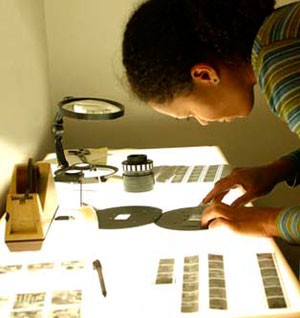Photographic Processor
Tasks & duties

Photographic processors may do some or all of the following:
-
clean, maintain and operate processing machines
-
mix the chemicals used to process and print film
-
operate the equipment used to process and print film
-
enlarge or reduce photographs
-
make changes to photographs if needed
-
inspect and sort completed work
-
trim and package the finished prints
-
record details of the job
-
collect payment and give change
In addition, photographic processors may serve customers by:
-
giving advice on photographic techniques
-
answering questions about cameras and film
-
answering questions about basic camera maintenance
-
helping solve problems such as how to extract film that is caught in a camera
-
helping customers choose cameras, lenses, film and other photographic accessories such as photo albums
-
taking passport and identification photographs
-
advising customers on digital camera images and printing
Skills & knowledge

Photographic processors need to have:
-
a good knowledge of photography, including different types of photographic techniques
-
knowledge of photographic production processes and materials
-
knowledge of developing film and using photographic chemicals
-
technical skills for using new methods and technology in photographic processing
-
good communication and sales skills
-
basic maths and computer skills
-
money-handling skills
Entry requirements
To become a photographic processor you need to work as a supervised trainee for a photographic processing company or for someone with experience. Employers often look for trainees who have an interest in, and a basic knowledge of, photography.
Secondary education
Either NCEA equivalent maths and science (or School Certificate) or NCEA equivalent English, maths and chemistry (or Sixth Form Certificate) is recommended for those interested in working as photographic processors.
Training on the job
Skills are gained on the job. Extra skills in colour theory, sales and marketing, maintenance of photographic processing machines and understanding new processing software may also be gained through film-processing company training courses.
Useful experience
Courses in photography, work as a photographic assistant or in a camera shop is useful experience for photographic processors. Laboratory work, sales work and computer experience, such as using photo-editing software, may also be helpful.
Related courses
Photography
For more information, please refer to Career Services.
Document Actions
